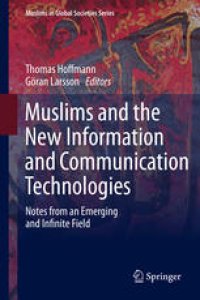
Ebook: Muslims and the New Information and Communication Technologies: Notes from an Emerging and Infinite Field
- Tags: Religious Studies, Anthropology, Computers and Society
- Series: Muslims in Global Societies Series 7
- Year: 2013
- Publisher: Springer Netherlands
- Edition: 1
- Language: English
- pdf
This volume deals with the so-called new Information and Communication Technologies (ICT) and their interrelationship with Muslims and the interpretation of Islam. This volume taps into what has been labelled Media Studies 2.0, which has been characterized by an intensified focus on everyday meanings and ‘lay’ users – in contrast to earlier emphases on experts or self-acclaimed experts. This lay adoption of ICT and the subsequent digital ‘literacy’ is not least noticeable among Muslim communities. According to some global estimates, one in ten internet users is a Muslim. This volume offers an ethnography of ICT in Muslim communities. The contributors to this volume also demonstrate a new kind of moderation with regard to more sweeping and avant-gardistic claims, which have characterized the study of ICT previously. This moderation has been combined with a keen attention to the empirical material but also deliberations on new quantitative and qualitative approaches to ICT, Muslims and Islam, for instance the digital challenges and changes wrought on the Qur’an, Islam’s sacred scripture. As such this volume will also be relevant for people interested in the study of ICT and the blooming field of digital humanities. Scholars of Islam and the Islamic world have always be engaged and entangled in their object of study. The developments within ICT have also affected how scholars take part in and influence public Islamic and academic discussions. This complicated issue provides basis for a number of meta-reflexive studies in this volume. It will be essential for students and scholars within Islamic studies but will also be of interest for anthropologists, sociologists and others with a humanistic interest in ICT, religion and Islam.
This volume deals with the so-called new Information and Communication Technologies (ICT) and their interrelationship with Muslims and the interpretation of Islam. This volume taps into what has been labelled Media Studies 2.0, which has been characterized by an intensified focus on everyday meanings and ‘lay’ users – in contrast to earlier emphases on experts or self-acclaimed experts. This lay adoption of ICT and the subsequent digital ‘literacy’ is not least noticeable among Muslim communities. According to some global estimates, one in ten internet users is a Muslim. This volume offers an ethnography of ICT in Muslim communities. The contributors to this volume also demonstrate a new kind of moderation with regard to more sweeping and avant-gardistic claims, which have characterized the study of ICT previously. This moderation has been combined with a keen attention to the empirical material but also deliberations on new quantitative and qualitative approaches to ICT, Muslims and Islam, for instance the digital challenges and changes wrought on the Qur’an, Islam’s sacred scripture. As such this volume will also be relevant for people interested in the study of ICT and the blooming field of digital humanities. Scholars of Islam and the Islamic world have always be engaged and entangled in their object of study. The developments within ICT have also affected how scholars take part in and influence public Islamic and academic discussions. This complicated issue provides basis for a number of meta-reflexive studies in this volume. It will be essential for students and scholars within Islamic studies but will also be of interest for anthropologists, sociologists and others with a humanistic interest in ICT, religion and Islam.